HND in Tourism: Sustainable & Responsible Tourism - Travelodge
VerifiedAdded on 2023/06/16
|13
|4130
|141
Report
AI Summary
This report delves into the concept of sustainable and responsible tourism management, particularly in the context of Travelodge, a prominent UK hotel chain. It examines the evolution of sustainable tourism, the roles of global organizations in promoting it, and the principles of tourism development and planning aimed at minimizing adverse effects. The report further analyzes the impacts of tourism activities from economic, social, cultural, and environmental perspectives, along with the sustainability principles implemented by tourism businesses to meet stakeholder requirements. It also explores the contributions of various stakeholders in developing sustainable tourism practices and evaluates the success or failure of sustainable management in tourist destinations worldwide. The study uses Travelodge as a case study to highlight the practical application and challenges of sustainable tourism management in the hospitality industry.
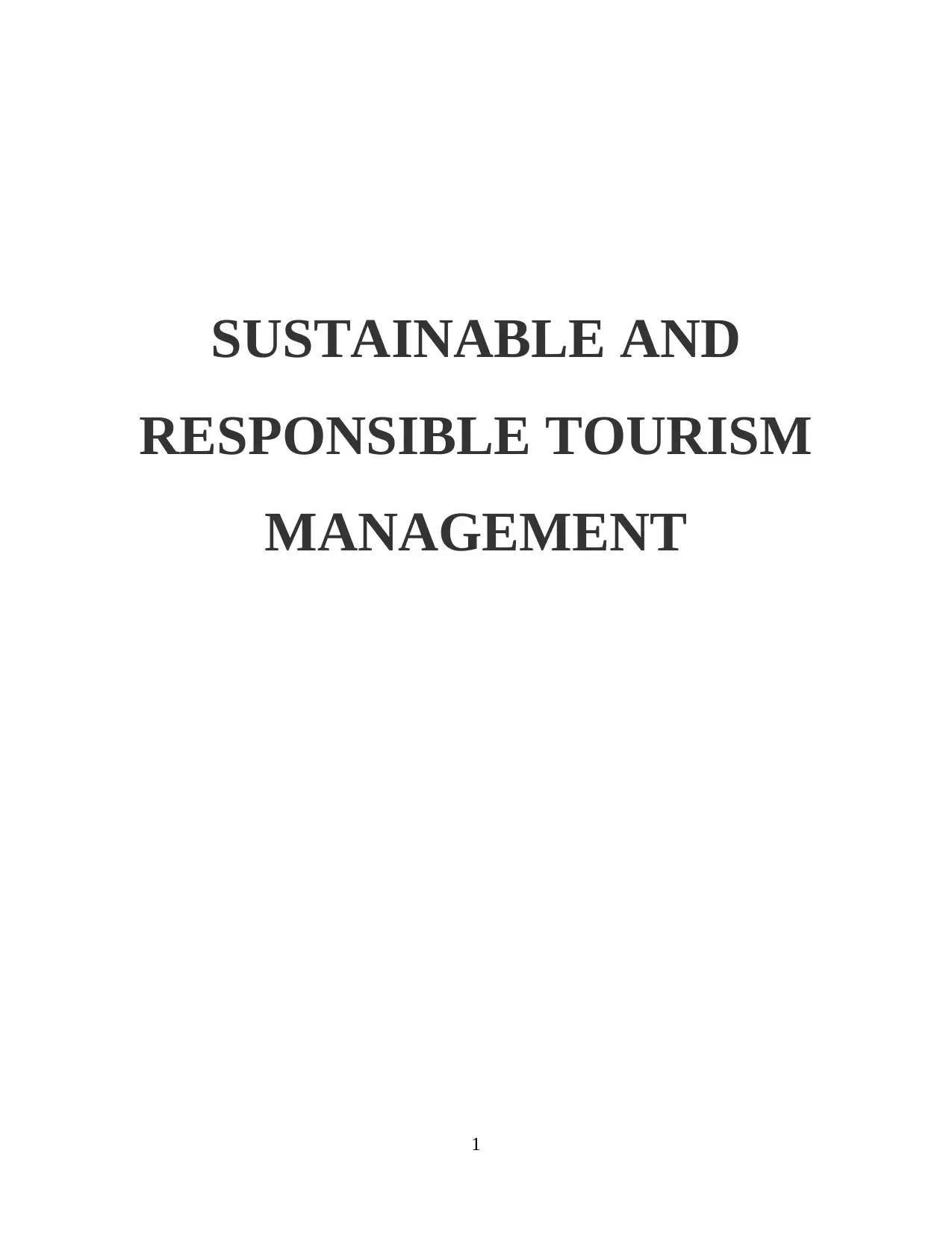
SUSTAINABLE AND
RESPONSIBLE TOURISM
MANAGEMENT
1
RESPONSIBLE TOURISM
MANAGEMENT
1
Paraphrase This Document
Need a fresh take? Get an instant paraphrase of this document with our AI Paraphraser
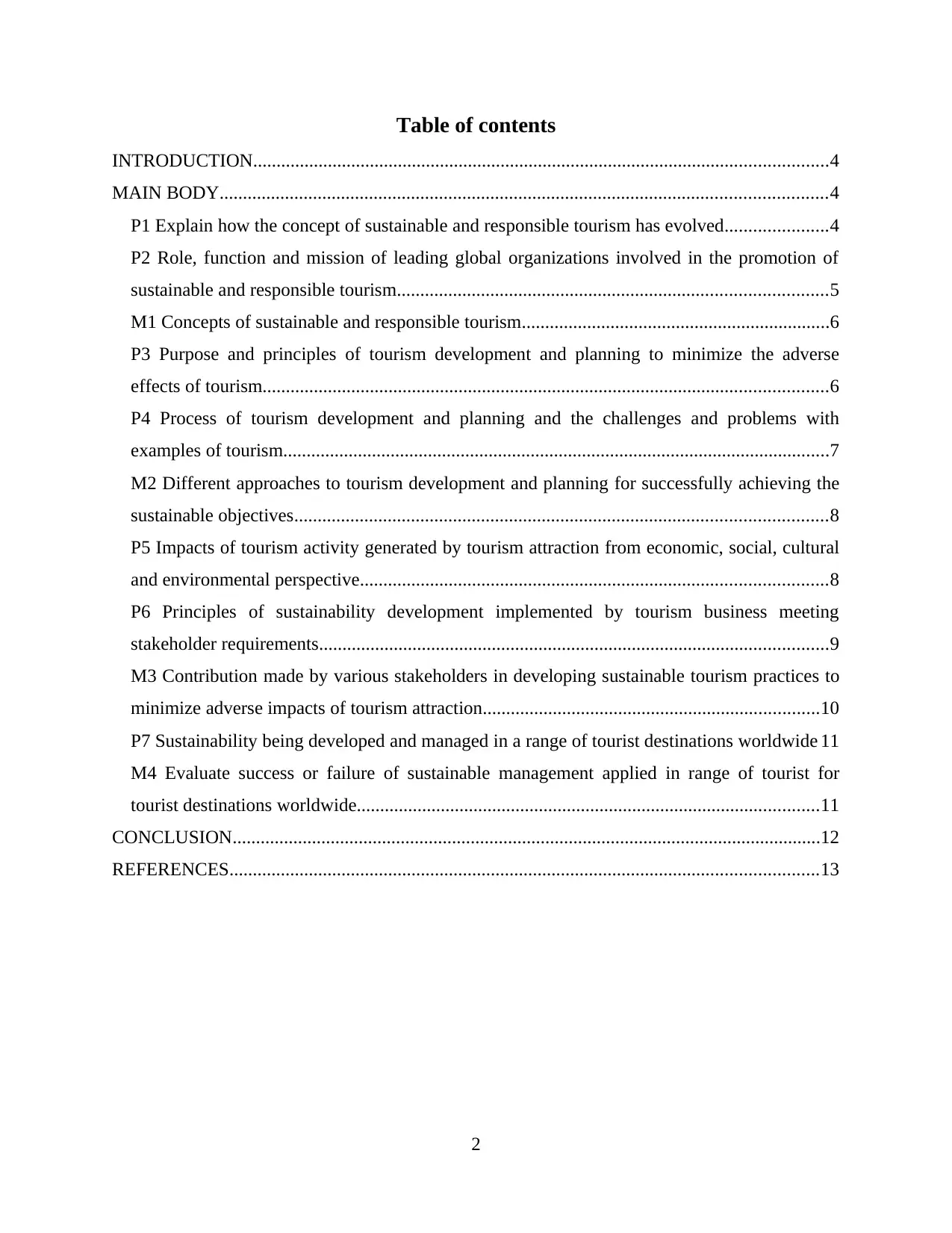
Table of contents
INTRODUCTION...........................................................................................................................4
MAIN BODY..................................................................................................................................4
P1 Explain how the concept of sustainable and responsible tourism has evolved......................4
P2 Role, function and mission of leading global organizations involved in the promotion of
sustainable and responsible tourism............................................................................................5
M1 Concepts of sustainable and responsible tourism..................................................................6
P3 Purpose and principles of tourism development and planning to minimize the adverse
effects of tourism.........................................................................................................................6
P4 Process of tourism development and planning and the challenges and problems with
examples of tourism.....................................................................................................................7
M2 Different approaches to tourism development and planning for successfully achieving the
sustainable objectives..................................................................................................................8
P5 Impacts of tourism activity generated by tourism attraction from economic, social, cultural
and environmental perspective....................................................................................................8
P6 Principles of sustainability development implemented by tourism business meeting
stakeholder requirements.............................................................................................................9
M3 Contribution made by various stakeholders in developing sustainable tourism practices to
minimize adverse impacts of tourism attraction........................................................................10
P7 Sustainability being developed and managed in a range of tourist destinations worldwide 11
M4 Evaluate success or failure of sustainable management applied in range of tourist for
tourist destinations worldwide...................................................................................................11
CONCLUSION..............................................................................................................................12
REFERENCES..............................................................................................................................13
2
INTRODUCTION...........................................................................................................................4
MAIN BODY..................................................................................................................................4
P1 Explain how the concept of sustainable and responsible tourism has evolved......................4
P2 Role, function and mission of leading global organizations involved in the promotion of
sustainable and responsible tourism............................................................................................5
M1 Concepts of sustainable and responsible tourism..................................................................6
P3 Purpose and principles of tourism development and planning to minimize the adverse
effects of tourism.........................................................................................................................6
P4 Process of tourism development and planning and the challenges and problems with
examples of tourism.....................................................................................................................7
M2 Different approaches to tourism development and planning for successfully achieving the
sustainable objectives..................................................................................................................8
P5 Impacts of tourism activity generated by tourism attraction from economic, social, cultural
and environmental perspective....................................................................................................8
P6 Principles of sustainability development implemented by tourism business meeting
stakeholder requirements.............................................................................................................9
M3 Contribution made by various stakeholders in developing sustainable tourism practices to
minimize adverse impacts of tourism attraction........................................................................10
P7 Sustainability being developed and managed in a range of tourist destinations worldwide 11
M4 Evaluate success or failure of sustainable management applied in range of tourist for
tourist destinations worldwide...................................................................................................11
CONCLUSION..............................................................................................................................12
REFERENCES..............................................................................................................................13
2
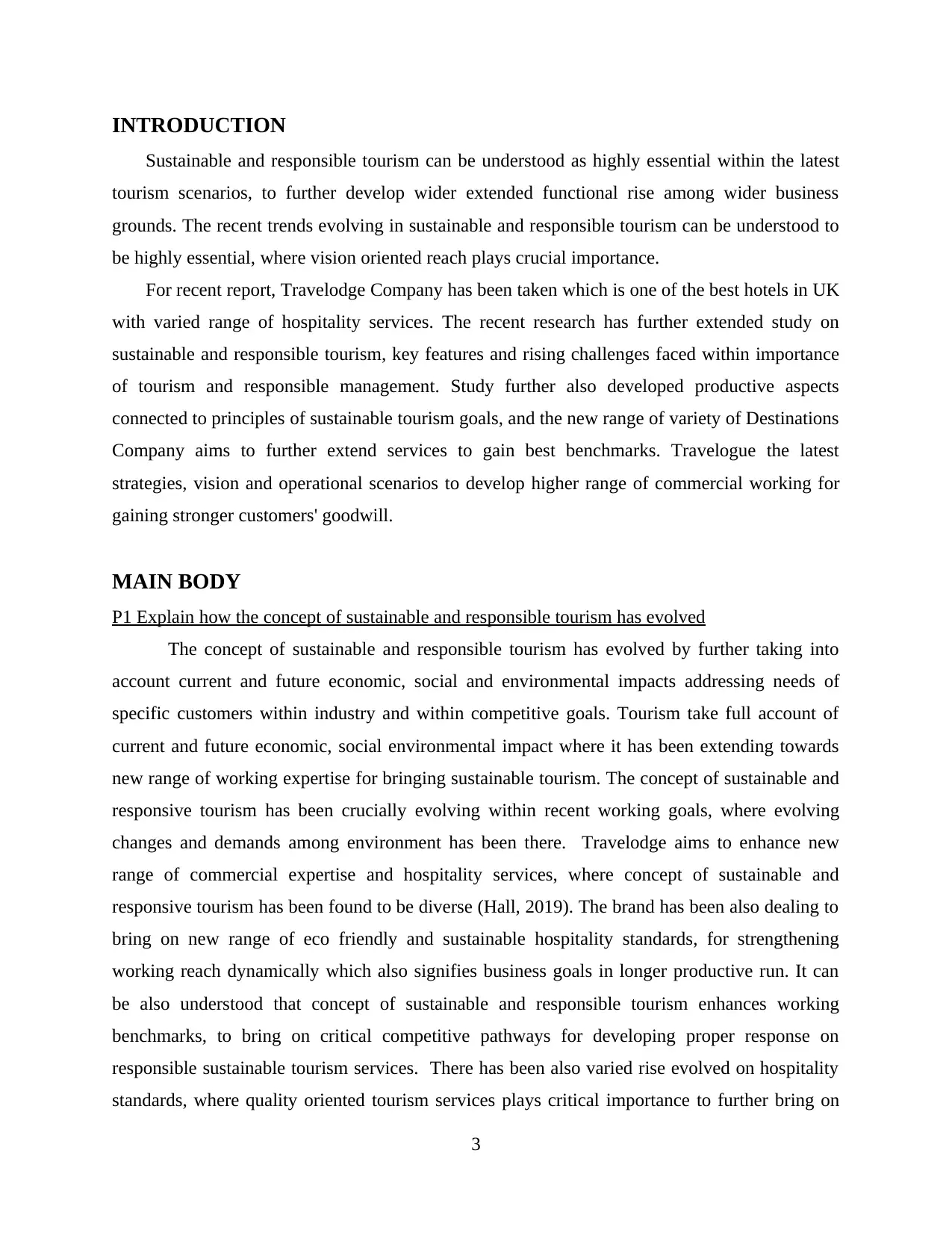
INTRODUCTION
Sustainable and responsible tourism can be understood as highly essential within the latest
tourism scenarios, to further develop wider extended functional rise among wider business
grounds. The recent trends evolving in sustainable and responsible tourism can be understood to
be highly essential, where vision oriented reach plays crucial importance.
For recent report, Travelodge Company has been taken which is one of the best hotels in UK
with varied range of hospitality services. The recent research has further extended study on
sustainable and responsible tourism, key features and rising challenges faced within importance
of tourism and responsible management. Study further also developed productive aspects
connected to principles of sustainable tourism goals, and the new range of variety of Destinations
Company aims to further extend services to gain best benchmarks. Travelogue the latest
strategies, vision and operational scenarios to develop higher range of commercial working for
gaining stronger customers' goodwill.
MAIN BODY
P1 Explain how the concept of sustainable and responsible tourism has evolved
The concept of sustainable and responsible tourism has evolved by further taking into
account current and future economic, social and environmental impacts addressing needs of
specific customers within industry and within competitive goals. Tourism take full account of
current and future economic, social environmental impact where it has been extending towards
new range of working expertise for bringing sustainable tourism. The concept of sustainable and
responsive tourism has been crucially evolving within recent working goals, where evolving
changes and demands among environment has been there. Travelodge aims to enhance new
range of commercial expertise and hospitality services, where concept of sustainable and
responsive tourism has been found to be diverse (Hall, 2019). The brand has been also dealing to
bring on new range of eco friendly and sustainable hospitality standards, for strengthening
working reach dynamically which also signifies business goals in longer productive run. It can
be also understood that concept of sustainable and responsible tourism enhances working
benchmarks, to bring on critical competitive pathways for developing proper response on
responsible sustainable tourism services. There has been also varied rise evolved on hospitality
standards, where quality oriented tourism services plays critical importance to further bring on
3
Sustainable and responsible tourism can be understood as highly essential within the latest
tourism scenarios, to further develop wider extended functional rise among wider business
grounds. The recent trends evolving in sustainable and responsible tourism can be understood to
be highly essential, where vision oriented reach plays crucial importance.
For recent report, Travelodge Company has been taken which is one of the best hotels in UK
with varied range of hospitality services. The recent research has further extended study on
sustainable and responsible tourism, key features and rising challenges faced within importance
of tourism and responsible management. Study further also developed productive aspects
connected to principles of sustainable tourism goals, and the new range of variety of Destinations
Company aims to further extend services to gain best benchmarks. Travelogue the latest
strategies, vision and operational scenarios to develop higher range of commercial working for
gaining stronger customers' goodwill.
MAIN BODY
P1 Explain how the concept of sustainable and responsible tourism has evolved
The concept of sustainable and responsible tourism has evolved by further taking into
account current and future economic, social and environmental impacts addressing needs of
specific customers within industry and within competitive goals. Tourism take full account of
current and future economic, social environmental impact where it has been extending towards
new range of working expertise for bringing sustainable tourism. The concept of sustainable and
responsive tourism has been crucially evolving within recent working goals, where evolving
changes and demands among environment has been there. Travelodge aims to enhance new
range of commercial expertise and hospitality services, where concept of sustainable and
responsive tourism has been found to be diverse (Hall, 2019). The brand has been also dealing to
bring on new range of eco friendly and sustainable hospitality standards, for strengthening
working reach dynamically which also signifies business goals in longer productive run. It can
be also understood that concept of sustainable and responsible tourism enhances working
benchmarks, to bring on critical competitive pathways for developing proper response on
responsible sustainable tourism services. There has been also varied rise evolved on hospitality
standards, where quality oriented tourism services plays critical importance to further bring on
3
⊘ This is a preview!⊘
Do you want full access?
Subscribe today to unlock all pages.

Trusted by 1+ million students worldwide
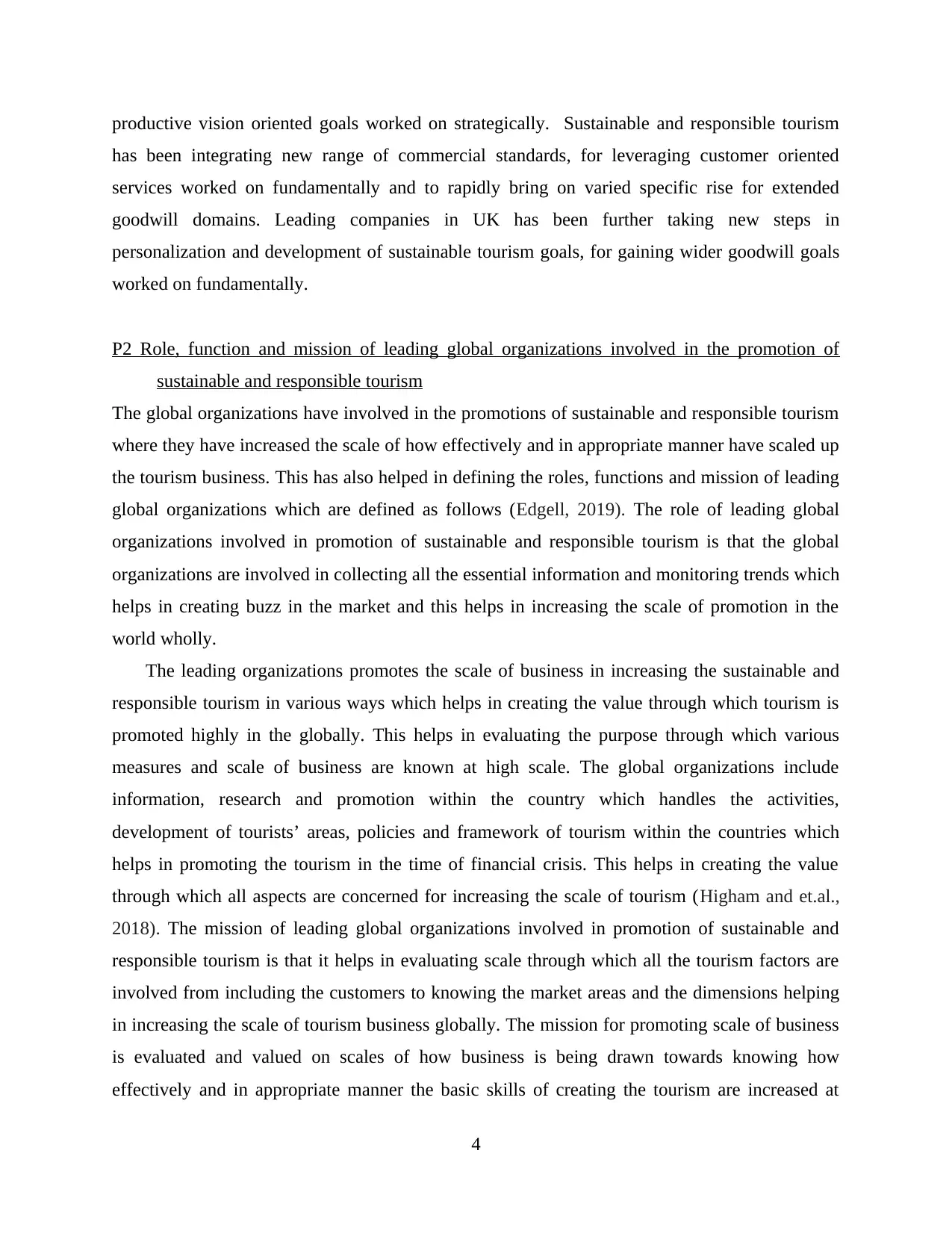
productive vision oriented goals worked on strategically. Sustainable and responsible tourism
has been integrating new range of commercial standards, for leveraging customer oriented
services worked on fundamentally and to rapidly bring on varied specific rise for extended
goodwill domains. Leading companies in UK has been further taking new steps in
personalization and development of sustainable tourism goals, for gaining wider goodwill goals
worked on fundamentally.
P2 Role, function and mission of leading global organizations involved in the promotion of
sustainable and responsible tourism
The global organizations have involved in the promotions of sustainable and responsible tourism
where they have increased the scale of how effectively and in appropriate manner have scaled up
the tourism business. This has also helped in defining the roles, functions and mission of leading
global organizations which are defined as follows (Edgell, 2019). The role of leading global
organizations involved in promotion of sustainable and responsible tourism is that the global
organizations are involved in collecting all the essential information and monitoring trends which
helps in creating buzz in the market and this helps in increasing the scale of promotion in the
world wholly.
The leading organizations promotes the scale of business in increasing the sustainable and
responsible tourism in various ways which helps in creating the value through which tourism is
promoted highly in the globally. This helps in evaluating the purpose through which various
measures and scale of business are known at high scale. The global organizations include
information, research and promotion within the country which handles the activities,
development of tourists’ areas, policies and framework of tourism within the countries which
helps in promoting the tourism in the time of financial crisis. This helps in creating the value
through which all aspects are concerned for increasing the scale of tourism (Higham and et.al.,
2018). The mission of leading global organizations involved in promotion of sustainable and
responsible tourism is that it helps in evaluating scale through which all the tourism factors are
involved from including the customers to knowing the market areas and the dimensions helping
in increasing the scale of tourism business globally. The mission for promoting scale of business
is evaluated and valued on scales of how business is being drawn towards knowing how
effectively and in appropriate manner the basic skills of creating the tourism are increased at
4
has been integrating new range of commercial standards, for leveraging customer oriented
services worked on fundamentally and to rapidly bring on varied specific rise for extended
goodwill domains. Leading companies in UK has been further taking new steps in
personalization and development of sustainable tourism goals, for gaining wider goodwill goals
worked on fundamentally.
P2 Role, function and mission of leading global organizations involved in the promotion of
sustainable and responsible tourism
The global organizations have involved in the promotions of sustainable and responsible tourism
where they have increased the scale of how effectively and in appropriate manner have scaled up
the tourism business. This has also helped in defining the roles, functions and mission of leading
global organizations which are defined as follows (Edgell, 2019). The role of leading global
organizations involved in promotion of sustainable and responsible tourism is that the global
organizations are involved in collecting all the essential information and monitoring trends which
helps in creating buzz in the market and this helps in increasing the scale of promotion in the
world wholly.
The leading organizations promotes the scale of business in increasing the sustainable and
responsible tourism in various ways which helps in creating the value through which tourism is
promoted highly in the globally. This helps in evaluating the purpose through which various
measures and scale of business are known at high scale. The global organizations include
information, research and promotion within the country which handles the activities,
development of tourists’ areas, policies and framework of tourism within the countries which
helps in promoting the tourism in the time of financial crisis. This helps in creating the value
through which all aspects are concerned for increasing the scale of tourism (Higham and et.al.,
2018). The mission of leading global organizations involved in promotion of sustainable and
responsible tourism is that it helps in evaluating scale through which all the tourism factors are
involved from including the customers to knowing the market areas and the dimensions helping
in increasing the scale of tourism business globally. The mission for promoting scale of business
is evaluated and valued on scales of how business is being drawn towards knowing how
effectively and in appropriate manner the basic skills of creating the tourism are increased at
4
Paraphrase This Document
Need a fresh take? Get an instant paraphrase of this document with our AI Paraphraser
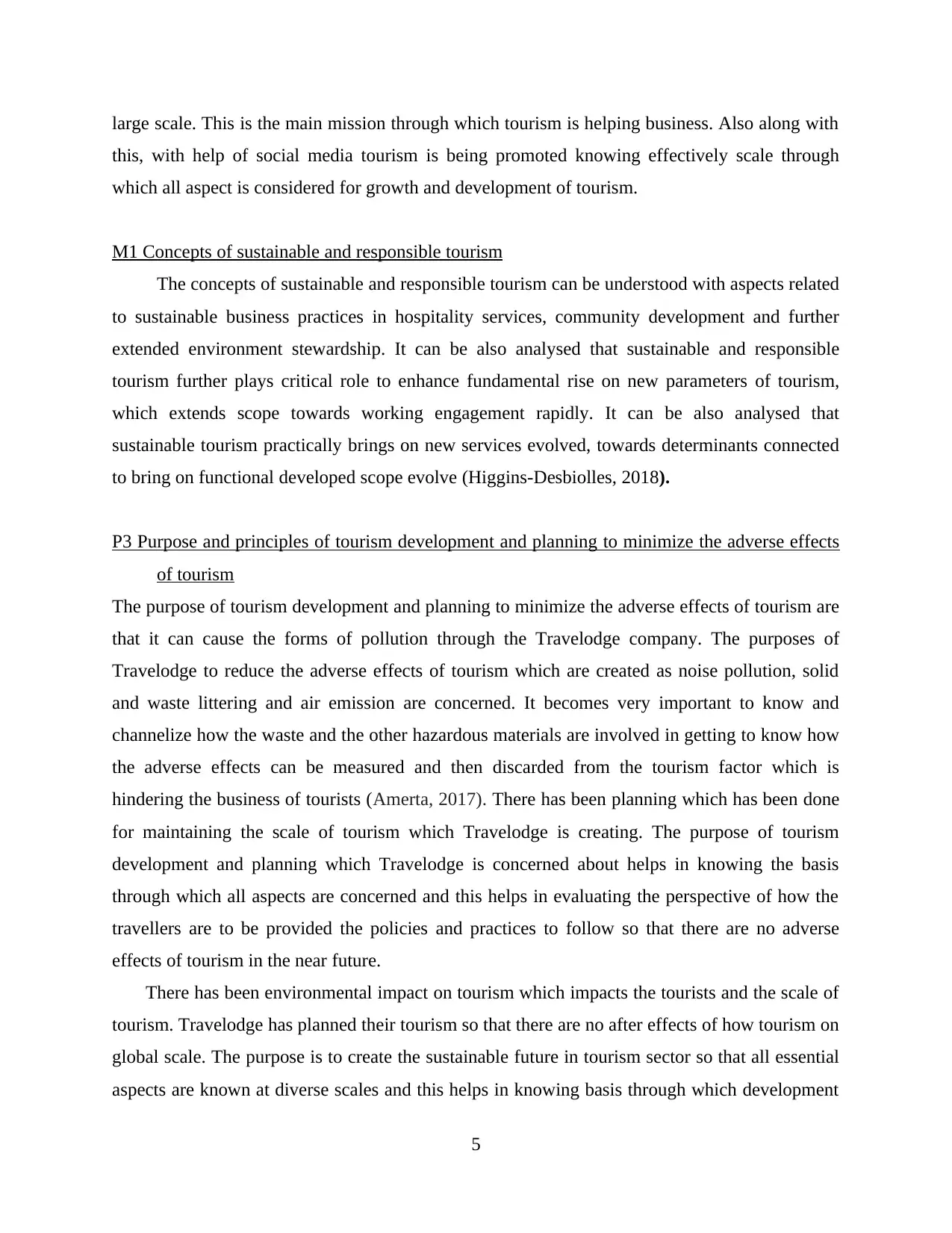
large scale. This is the main mission through which tourism is helping business. Also along with
this, with help of social media tourism is being promoted knowing effectively scale through
which all aspect is considered for growth and development of tourism.
M1 Concepts of sustainable and responsible tourism
The concepts of sustainable and responsible tourism can be understood with aspects related
to sustainable business practices in hospitality services, community development and further
extended environment stewardship. It can be also analysed that sustainable and responsible
tourism further plays critical role to enhance fundamental rise on new parameters of tourism,
which extends scope towards working engagement rapidly. It can be also analysed that
sustainable tourism practically brings on new services evolved, towards determinants connected
to bring on functional developed scope evolve (Higgins-Desbiolles, 2018).
P3 Purpose and principles of tourism development and planning to minimize the adverse effects
of tourism
The purpose of tourism development and planning to minimize the adverse effects of tourism are
that it can cause the forms of pollution through the Travelodge company. The purposes of
Travelodge to reduce the adverse effects of tourism which are created as noise pollution, solid
and waste littering and air emission are concerned. It becomes very important to know and
channelize how the waste and the other hazardous materials are involved in getting to know how
the adverse effects can be measured and then discarded from the tourism factor which is
hindering the business of tourists (Amerta, 2017). There has been planning which has been done
for maintaining the scale of tourism which Travelodge is creating. The purpose of tourism
development and planning which Travelodge is concerned about helps in knowing the basis
through which all aspects are concerned and this helps in evaluating the perspective of how the
travellers are to be provided the policies and practices to follow so that there are no adverse
effects of tourism in the near future.
There has been environmental impact on tourism which impacts the tourists and the scale of
tourism. Travelodge has planned their tourism so that there are no after effects of how tourism on
global scale. The purpose is to create the sustainable future in tourism sector so that all essential
aspects are known at diverse scales and this helps in knowing basis through which development
5
this, with help of social media tourism is being promoted knowing effectively scale through
which all aspect is considered for growth and development of tourism.
M1 Concepts of sustainable and responsible tourism
The concepts of sustainable and responsible tourism can be understood with aspects related
to sustainable business practices in hospitality services, community development and further
extended environment stewardship. It can be also analysed that sustainable and responsible
tourism further plays critical role to enhance fundamental rise on new parameters of tourism,
which extends scope towards working engagement rapidly. It can be also analysed that
sustainable tourism practically brings on new services evolved, towards determinants connected
to bring on functional developed scope evolve (Higgins-Desbiolles, 2018).
P3 Purpose and principles of tourism development and planning to minimize the adverse effects
of tourism
The purpose of tourism development and planning to minimize the adverse effects of tourism are
that it can cause the forms of pollution through the Travelodge company. The purposes of
Travelodge to reduce the adverse effects of tourism which are created as noise pollution, solid
and waste littering and air emission are concerned. It becomes very important to know and
channelize how the waste and the other hazardous materials are involved in getting to know how
the adverse effects can be measured and then discarded from the tourism factor which is
hindering the business of tourists (Amerta, 2017). There has been planning which has been done
for maintaining the scale of tourism which Travelodge is creating. The purpose of tourism
development and planning which Travelodge is concerned about helps in knowing the basis
through which all aspects are concerned and this helps in evaluating the perspective of how the
travellers are to be provided the policies and practices to follow so that there are no adverse
effects of tourism in the near future.
There has been environmental impact on tourism which impacts the tourists and the scale of
tourism. Travelodge has planned their tourism so that there are no after effects of how tourism on
global scale. The purpose is to create the sustainable future in tourism sector so that all essential
aspects are known at diverse scales and this helps in knowing basis through which development
5
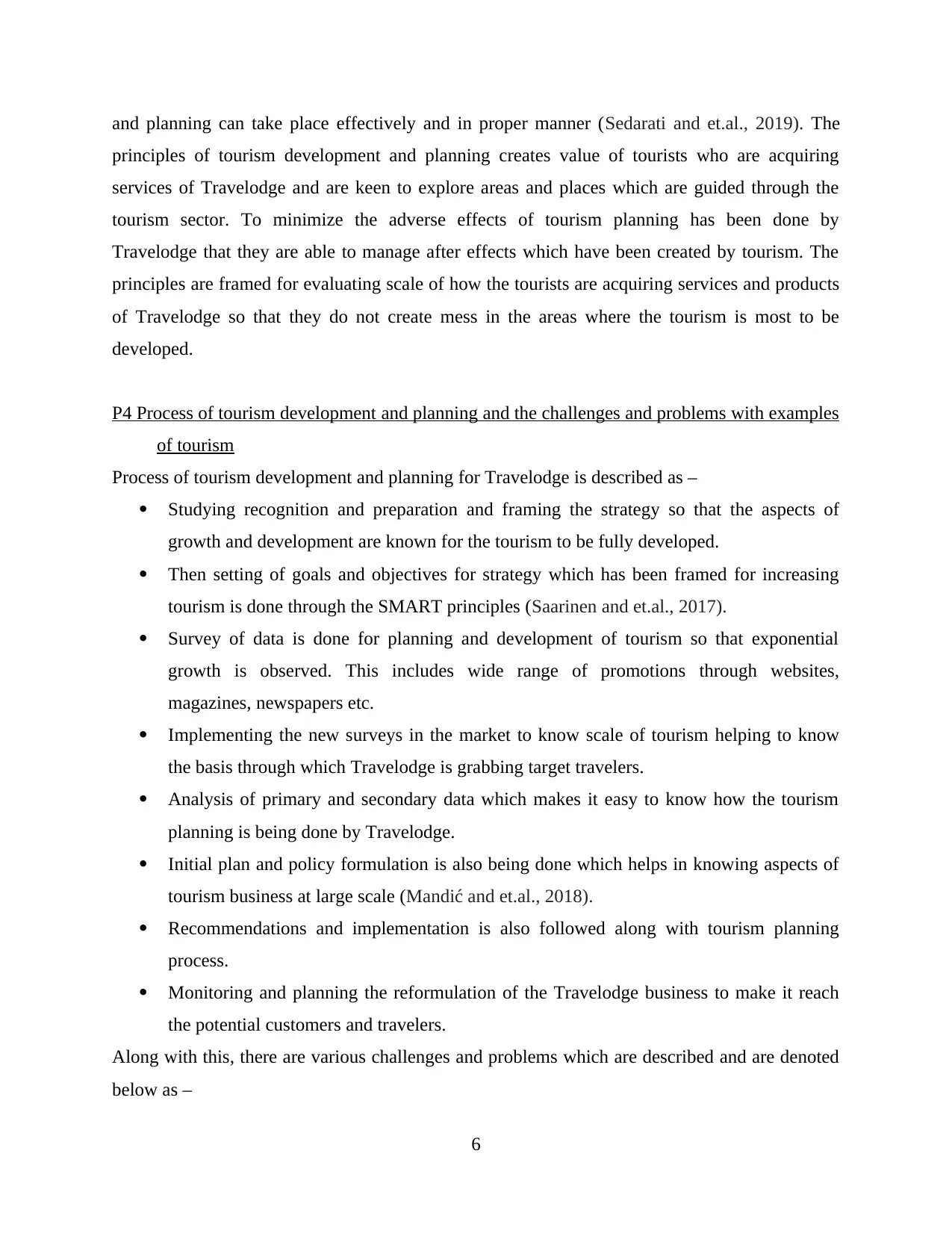
and planning can take place effectively and in proper manner (Sedarati and et.al., 2019). The
principles of tourism development and planning creates value of tourists who are acquiring
services of Travelodge and are keen to explore areas and places which are guided through the
tourism sector. To minimize the adverse effects of tourism planning has been done by
Travelodge that they are able to manage after effects which have been created by tourism. The
principles are framed for evaluating scale of how the tourists are acquiring services and products
of Travelodge so that they do not create mess in the areas where the tourism is most to be
developed.
P4 Process of tourism development and planning and the challenges and problems with examples
of tourism
Process of tourism development and planning for Travelodge is described as –
Studying recognition and preparation and framing the strategy so that the aspects of
growth and development are known for the tourism to be fully developed.
Then setting of goals and objectives for strategy which has been framed for increasing
tourism is done through the SMART principles (Saarinen and et.al., 2017).
Survey of data is done for planning and development of tourism so that exponential
growth is observed. This includes wide range of promotions through websites,
magazines, newspapers etc.
Implementing the new surveys in the market to know scale of tourism helping to know
the basis through which Travelodge is grabbing target travelers.
Analysis of primary and secondary data which makes it easy to know how the tourism
planning is being done by Travelodge.
Initial plan and policy formulation is also being done which helps in knowing aspects of
tourism business at large scale (Mandić and et.al., 2018).
Recommendations and implementation is also followed along with tourism planning
process.
Monitoring and planning the reformulation of the Travelodge business to make it reach
the potential customers and travelers.
Along with this, there are various challenges and problems which are described and are denoted
below as –
6
principles of tourism development and planning creates value of tourists who are acquiring
services of Travelodge and are keen to explore areas and places which are guided through the
tourism sector. To minimize the adverse effects of tourism planning has been done by
Travelodge that they are able to manage after effects which have been created by tourism. The
principles are framed for evaluating scale of how the tourists are acquiring services and products
of Travelodge so that they do not create mess in the areas where the tourism is most to be
developed.
P4 Process of tourism development and planning and the challenges and problems with examples
of tourism
Process of tourism development and planning for Travelodge is described as –
Studying recognition and preparation and framing the strategy so that the aspects of
growth and development are known for the tourism to be fully developed.
Then setting of goals and objectives for strategy which has been framed for increasing
tourism is done through the SMART principles (Saarinen and et.al., 2017).
Survey of data is done for planning and development of tourism so that exponential
growth is observed. This includes wide range of promotions through websites,
magazines, newspapers etc.
Implementing the new surveys in the market to know scale of tourism helping to know
the basis through which Travelodge is grabbing target travelers.
Analysis of primary and secondary data which makes it easy to know how the tourism
planning is being done by Travelodge.
Initial plan and policy formulation is also being done which helps in knowing aspects of
tourism business at large scale (Mandić and et.al., 2018).
Recommendations and implementation is also followed along with tourism planning
process.
Monitoring and planning the reformulation of the Travelodge business to make it reach
the potential customers and travelers.
Along with this, there are various challenges and problems which are described and are denoted
below as –
6
⊘ This is a preview!⊘
Do you want full access?
Subscribe today to unlock all pages.

Trusted by 1+ million students worldwide
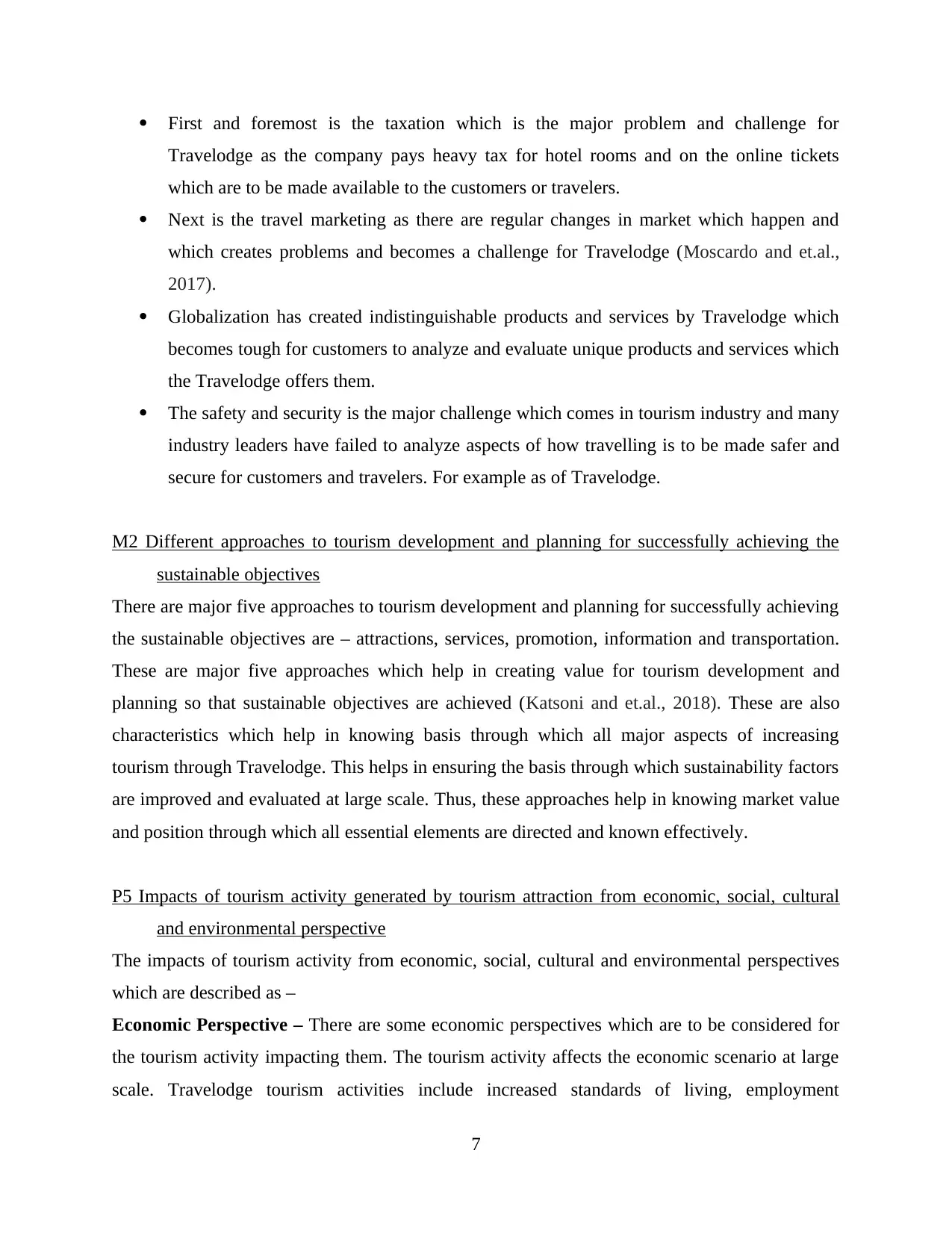
First and foremost is the taxation which is the major problem and challenge for
Travelodge as the company pays heavy tax for hotel rooms and on the online tickets
which are to be made available to the customers or travelers.
Next is the travel marketing as there are regular changes in market which happen and
which creates problems and becomes a challenge for Travelodge (Moscardo and et.al.,
2017).
Globalization has created indistinguishable products and services by Travelodge which
becomes tough for customers to analyze and evaluate unique products and services which
the Travelodge offers them.
The safety and security is the major challenge which comes in tourism industry and many
industry leaders have failed to analyze aspects of how travelling is to be made safer and
secure for customers and travelers. For example as of Travelodge.
M2 Different approaches to tourism development and planning for successfully achieving the
sustainable objectives
There are major five approaches to tourism development and planning for successfully achieving
the sustainable objectives are – attractions, services, promotion, information and transportation.
These are major five approaches which help in creating value for tourism development and
planning so that sustainable objectives are achieved (Katsoni and et.al., 2018). These are also
characteristics which help in knowing basis through which all major aspects of increasing
tourism through Travelodge. This helps in ensuring the basis through which sustainability factors
are improved and evaluated at large scale. Thus, these approaches help in knowing market value
and position through which all essential elements are directed and known effectively.
P5 Impacts of tourism activity generated by tourism attraction from economic, social, cultural
and environmental perspective
The impacts of tourism activity from economic, social, cultural and environmental perspectives
which are described as –
Economic Perspective – There are some economic perspectives which are to be considered for
the tourism activity impacting them. The tourism activity affects the economic scenario at large
scale. Travelodge tourism activities include increased standards of living, employment
7
Travelodge as the company pays heavy tax for hotel rooms and on the online tickets
which are to be made available to the customers or travelers.
Next is the travel marketing as there are regular changes in market which happen and
which creates problems and becomes a challenge for Travelodge (Moscardo and et.al.,
2017).
Globalization has created indistinguishable products and services by Travelodge which
becomes tough for customers to analyze and evaluate unique products and services which
the Travelodge offers them.
The safety and security is the major challenge which comes in tourism industry and many
industry leaders have failed to analyze aspects of how travelling is to be made safer and
secure for customers and travelers. For example as of Travelodge.
M2 Different approaches to tourism development and planning for successfully achieving the
sustainable objectives
There are major five approaches to tourism development and planning for successfully achieving
the sustainable objectives are – attractions, services, promotion, information and transportation.
These are major five approaches which help in creating value for tourism development and
planning so that sustainable objectives are achieved (Katsoni and et.al., 2018). These are also
characteristics which help in knowing basis through which all major aspects of increasing
tourism through Travelodge. This helps in ensuring the basis through which sustainability factors
are improved and evaluated at large scale. Thus, these approaches help in knowing market value
and position through which all essential elements are directed and known effectively.
P5 Impacts of tourism activity generated by tourism attraction from economic, social, cultural
and environmental perspective
The impacts of tourism activity from economic, social, cultural and environmental perspectives
which are described as –
Economic Perspective – There are some economic perspectives which are to be considered for
the tourism activity impacting them. The tourism activity affects the economic scenario at large
scale. Travelodge tourism activities include increased standards of living, employment
7
Paraphrase This Document
Need a fresh take? Get an instant paraphrase of this document with our AI Paraphraser
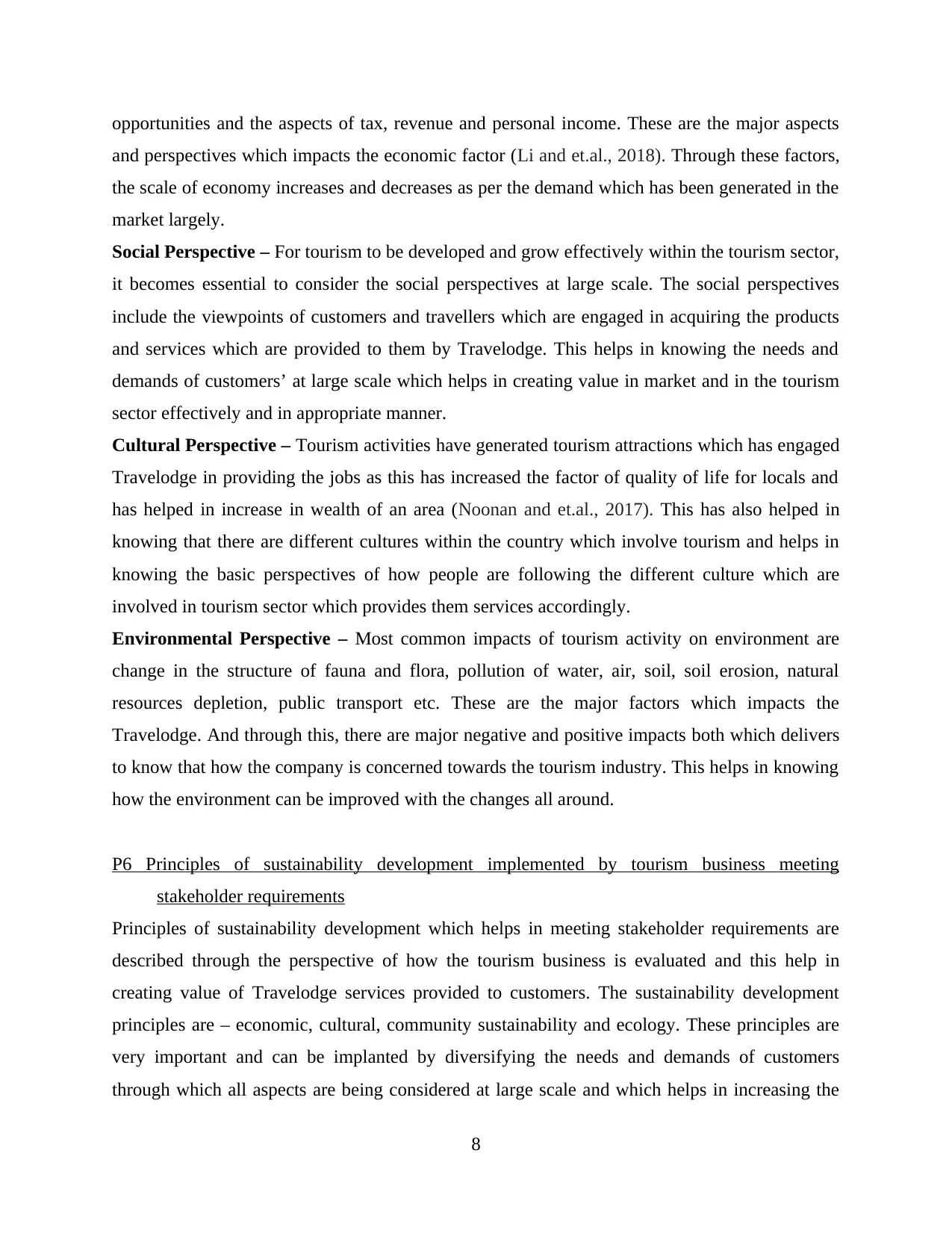
opportunities and the aspects of tax, revenue and personal income. These are the major aspects
and perspectives which impacts the economic factor (Li and et.al., 2018). Through these factors,
the scale of economy increases and decreases as per the demand which has been generated in the
market largely.
Social Perspective – For tourism to be developed and grow effectively within the tourism sector,
it becomes essential to consider the social perspectives at large scale. The social perspectives
include the viewpoints of customers and travellers which are engaged in acquiring the products
and services which are provided to them by Travelodge. This helps in knowing the needs and
demands of customers’ at large scale which helps in creating value in market and in the tourism
sector effectively and in appropriate manner.
Cultural Perspective – Tourism activities have generated tourism attractions which has engaged
Travelodge in providing the jobs as this has increased the factor of quality of life for locals and
has helped in increase in wealth of an area (Noonan and et.al., 2017). This has also helped in
knowing that there are different cultures within the country which involve tourism and helps in
knowing the basic perspectives of how people are following the different culture which are
involved in tourism sector which provides them services accordingly.
Environmental Perspective – Most common impacts of tourism activity on environment are
change in the structure of fauna and flora, pollution of water, air, soil, soil erosion, natural
resources depletion, public transport etc. These are the major factors which impacts the
Travelodge. And through this, there are major negative and positive impacts both which delivers
to know that how the company is concerned towards the tourism industry. This helps in knowing
how the environment can be improved with the changes all around.
P6 Principles of sustainability development implemented by tourism business meeting
stakeholder requirements
Principles of sustainability development which helps in meeting stakeholder requirements are
described through the perspective of how the tourism business is evaluated and this help in
creating value of Travelodge services provided to customers. The sustainability development
principles are – economic, cultural, community sustainability and ecology. These principles are
very important and can be implanted by diversifying the needs and demands of customers
through which all aspects are being considered at large scale and which helps in increasing the
8
and perspectives which impacts the economic factor (Li and et.al., 2018). Through these factors,
the scale of economy increases and decreases as per the demand which has been generated in the
market largely.
Social Perspective – For tourism to be developed and grow effectively within the tourism sector,
it becomes essential to consider the social perspectives at large scale. The social perspectives
include the viewpoints of customers and travellers which are engaged in acquiring the products
and services which are provided to them by Travelodge. This helps in knowing the needs and
demands of customers’ at large scale which helps in creating value in market and in the tourism
sector effectively and in appropriate manner.
Cultural Perspective – Tourism activities have generated tourism attractions which has engaged
Travelodge in providing the jobs as this has increased the factor of quality of life for locals and
has helped in increase in wealth of an area (Noonan and et.al., 2017). This has also helped in
knowing that there are different cultures within the country which involve tourism and helps in
knowing the basic perspectives of how people are following the different culture which are
involved in tourism sector which provides them services accordingly.
Environmental Perspective – Most common impacts of tourism activity on environment are
change in the structure of fauna and flora, pollution of water, air, soil, soil erosion, natural
resources depletion, public transport etc. These are the major factors which impacts the
Travelodge. And through this, there are major negative and positive impacts both which delivers
to know that how the company is concerned towards the tourism industry. This helps in knowing
how the environment can be improved with the changes all around.
P6 Principles of sustainability development implemented by tourism business meeting
stakeholder requirements
Principles of sustainability development which helps in meeting stakeholder requirements are
described through the perspective of how the tourism business is evaluated and this help in
creating value of Travelodge services provided to customers. The sustainability development
principles are – economic, cultural, community sustainability and ecology. These principles are
very important and can be implanted by diversifying the needs and demands of customers
through which all aspects are being considered at large scale and which helps in increasing the
8
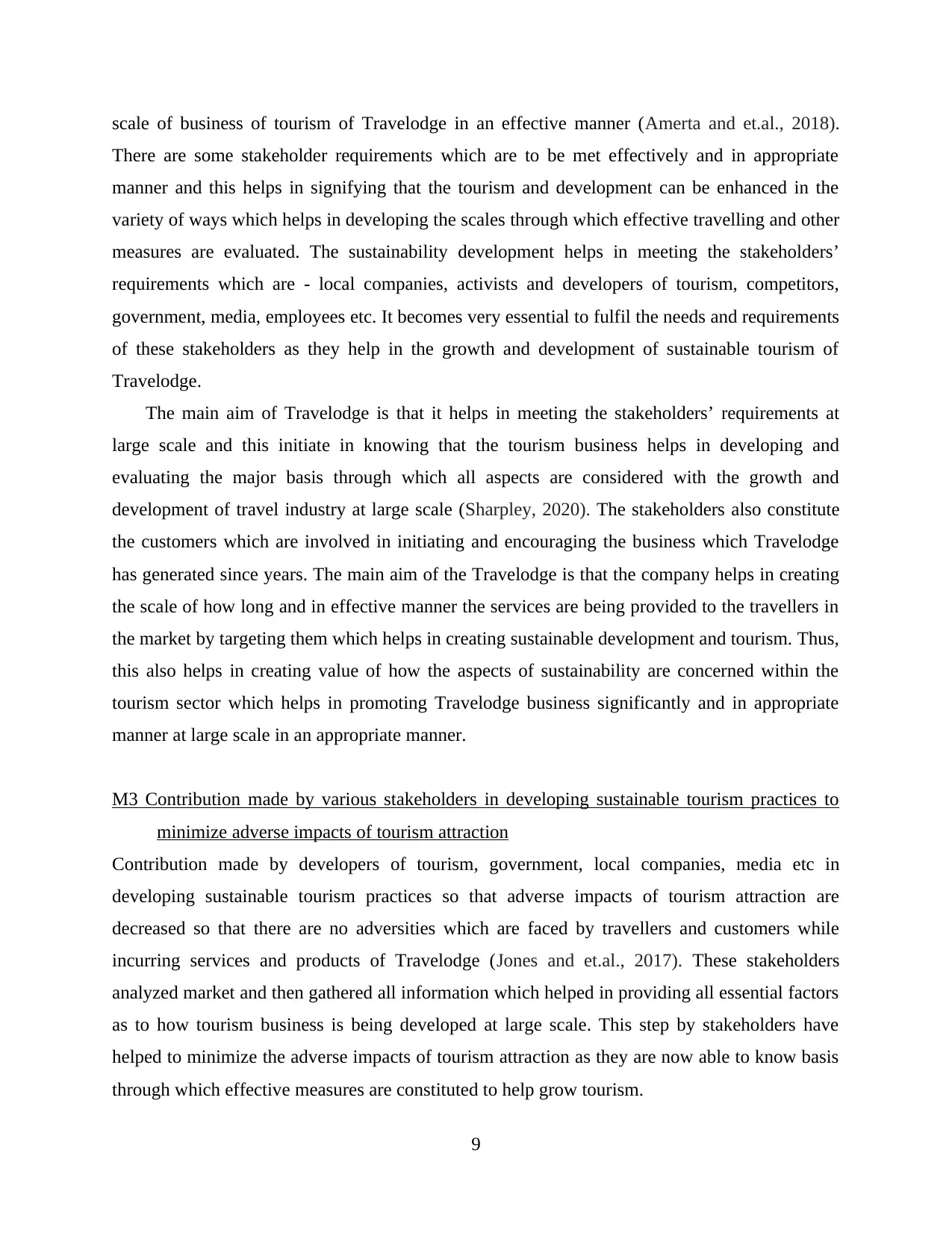
scale of business of tourism of Travelodge in an effective manner (Amerta and et.al., 2018).
There are some stakeholder requirements which are to be met effectively and in appropriate
manner and this helps in signifying that the tourism and development can be enhanced in the
variety of ways which helps in developing the scales through which effective travelling and other
measures are evaluated. The sustainability development helps in meeting the stakeholders’
requirements which are - local companies, activists and developers of tourism, competitors,
government, media, employees etc. It becomes very essential to fulfil the needs and requirements
of these stakeholders as they help in the growth and development of sustainable tourism of
Travelodge.
The main aim of Travelodge is that it helps in meeting the stakeholders’ requirements at
large scale and this initiate in knowing that the tourism business helps in developing and
evaluating the major basis through which all aspects are considered with the growth and
development of travel industry at large scale (Sharpley, 2020). The stakeholders also constitute
the customers which are involved in initiating and encouraging the business which Travelodge
has generated since years. The main aim of the Travelodge is that the company helps in creating
the scale of how long and in effective manner the services are being provided to the travellers in
the market by targeting them which helps in creating sustainable development and tourism. Thus,
this also helps in creating value of how the aspects of sustainability are concerned within the
tourism sector which helps in promoting Travelodge business significantly and in appropriate
manner at large scale in an appropriate manner.
M3 Contribution made by various stakeholders in developing sustainable tourism practices to
minimize adverse impacts of tourism attraction
Contribution made by developers of tourism, government, local companies, media etc in
developing sustainable tourism practices so that adverse impacts of tourism attraction are
decreased so that there are no adversities which are faced by travellers and customers while
incurring services and products of Travelodge (Jones and et.al., 2017). These stakeholders
analyzed market and then gathered all information which helped in providing all essential factors
as to how tourism business is being developed at large scale. This step by stakeholders have
helped to minimize the adverse impacts of tourism attraction as they are now able to know basis
through which effective measures are constituted to help grow tourism.
9
There are some stakeholder requirements which are to be met effectively and in appropriate
manner and this helps in signifying that the tourism and development can be enhanced in the
variety of ways which helps in developing the scales through which effective travelling and other
measures are evaluated. The sustainability development helps in meeting the stakeholders’
requirements which are - local companies, activists and developers of tourism, competitors,
government, media, employees etc. It becomes very essential to fulfil the needs and requirements
of these stakeholders as they help in the growth and development of sustainable tourism of
Travelodge.
The main aim of Travelodge is that it helps in meeting the stakeholders’ requirements at
large scale and this initiate in knowing that the tourism business helps in developing and
evaluating the major basis through which all aspects are considered with the growth and
development of travel industry at large scale (Sharpley, 2020). The stakeholders also constitute
the customers which are involved in initiating and encouraging the business which Travelodge
has generated since years. The main aim of the Travelodge is that the company helps in creating
the scale of how long and in effective manner the services are being provided to the travellers in
the market by targeting them which helps in creating sustainable development and tourism. Thus,
this also helps in creating value of how the aspects of sustainability are concerned within the
tourism sector which helps in promoting Travelodge business significantly and in appropriate
manner at large scale in an appropriate manner.
M3 Contribution made by various stakeholders in developing sustainable tourism practices to
minimize adverse impacts of tourism attraction
Contribution made by developers of tourism, government, local companies, media etc in
developing sustainable tourism practices so that adverse impacts of tourism attraction are
decreased so that there are no adversities which are faced by travellers and customers while
incurring services and products of Travelodge (Jones and et.al., 2017). These stakeholders
analyzed market and then gathered all information which helped in providing all essential factors
as to how tourism business is being developed at large scale. This step by stakeholders have
helped to minimize the adverse impacts of tourism attraction as they are now able to know basis
through which effective measures are constituted to help grow tourism.
9
⊘ This is a preview!⊘
Do you want full access?
Subscribe today to unlock all pages.

Trusted by 1+ million students worldwide
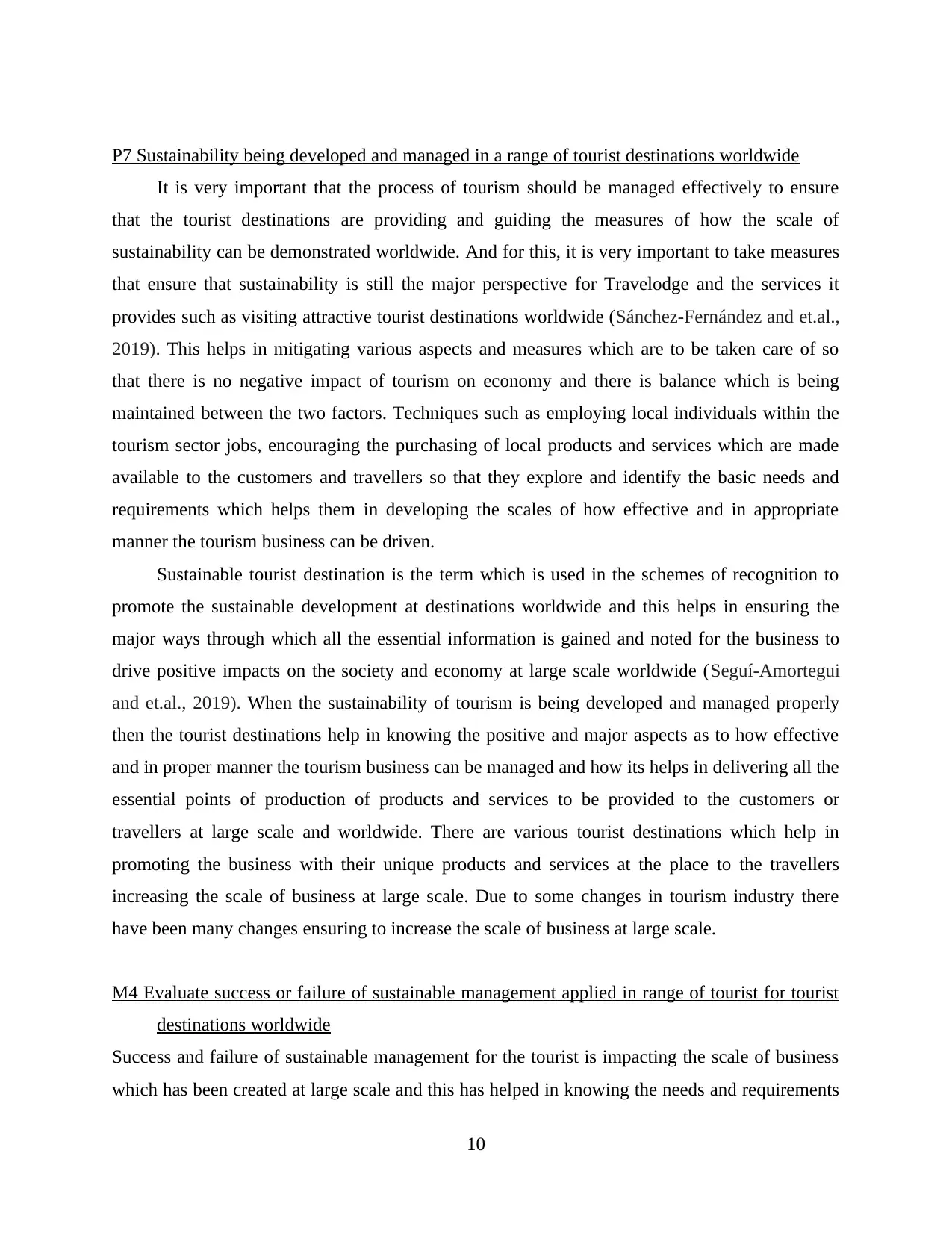
P7 Sustainability being developed and managed in a range of tourist destinations worldwide
It is very important that the process of tourism should be managed effectively to ensure
that the tourist destinations are providing and guiding the measures of how the scale of
sustainability can be demonstrated worldwide. And for this, it is very important to take measures
that ensure that sustainability is still the major perspective for Travelodge and the services it
provides such as visiting attractive tourist destinations worldwide (Sánchez-Fernández and et.al.,
2019). This helps in mitigating various aspects and measures which are to be taken care of so
that there is no negative impact of tourism on economy and there is balance which is being
maintained between the two factors. Techniques such as employing local individuals within the
tourism sector jobs, encouraging the purchasing of local products and services which are made
available to the customers and travellers so that they explore and identify the basic needs and
requirements which helps them in developing the scales of how effective and in appropriate
manner the tourism business can be driven.
Sustainable tourist destination is the term which is used in the schemes of recognition to
promote the sustainable development at destinations worldwide and this helps in ensuring the
major ways through which all the essential information is gained and noted for the business to
drive positive impacts on the society and economy at large scale worldwide (Seguí-Amortegui
and et.al., 2019). When the sustainability of tourism is being developed and managed properly
then the tourist destinations help in knowing the positive and major aspects as to how effective
and in proper manner the tourism business can be managed and how its helps in delivering all the
essential points of production of products and services to be provided to the customers or
travellers at large scale and worldwide. There are various tourist destinations which help in
promoting the business with their unique products and services at the place to the travellers
increasing the scale of business at large scale. Due to some changes in tourism industry there
have been many changes ensuring to increase the scale of business at large scale.
M4 Evaluate success or failure of sustainable management applied in range of tourist for tourist
destinations worldwide
Success and failure of sustainable management for the tourist is impacting the scale of business
which has been created at large scale and this has helped in knowing the needs and requirements
10
It is very important that the process of tourism should be managed effectively to ensure
that the tourist destinations are providing and guiding the measures of how the scale of
sustainability can be demonstrated worldwide. And for this, it is very important to take measures
that ensure that sustainability is still the major perspective for Travelodge and the services it
provides such as visiting attractive tourist destinations worldwide (Sánchez-Fernández and et.al.,
2019). This helps in mitigating various aspects and measures which are to be taken care of so
that there is no negative impact of tourism on economy and there is balance which is being
maintained between the two factors. Techniques such as employing local individuals within the
tourism sector jobs, encouraging the purchasing of local products and services which are made
available to the customers and travellers so that they explore and identify the basic needs and
requirements which helps them in developing the scales of how effective and in appropriate
manner the tourism business can be driven.
Sustainable tourist destination is the term which is used in the schemes of recognition to
promote the sustainable development at destinations worldwide and this helps in ensuring the
major ways through which all the essential information is gained and noted for the business to
drive positive impacts on the society and economy at large scale worldwide (Seguí-Amortegui
and et.al., 2019). When the sustainability of tourism is being developed and managed properly
then the tourist destinations help in knowing the positive and major aspects as to how effective
and in proper manner the tourism business can be managed and how its helps in delivering all the
essential points of production of products and services to be provided to the customers or
travellers at large scale and worldwide. There are various tourist destinations which help in
promoting the business with their unique products and services at the place to the travellers
increasing the scale of business at large scale. Due to some changes in tourism industry there
have been many changes ensuring to increase the scale of business at large scale.
M4 Evaluate success or failure of sustainable management applied in range of tourist for tourist
destinations worldwide
Success and failure of sustainable management for the tourist is impacting the scale of business
which has been created at large scale and this has helped in knowing the needs and requirements
10
Paraphrase This Document
Need a fresh take? Get an instant paraphrase of this document with our AI Paraphraser
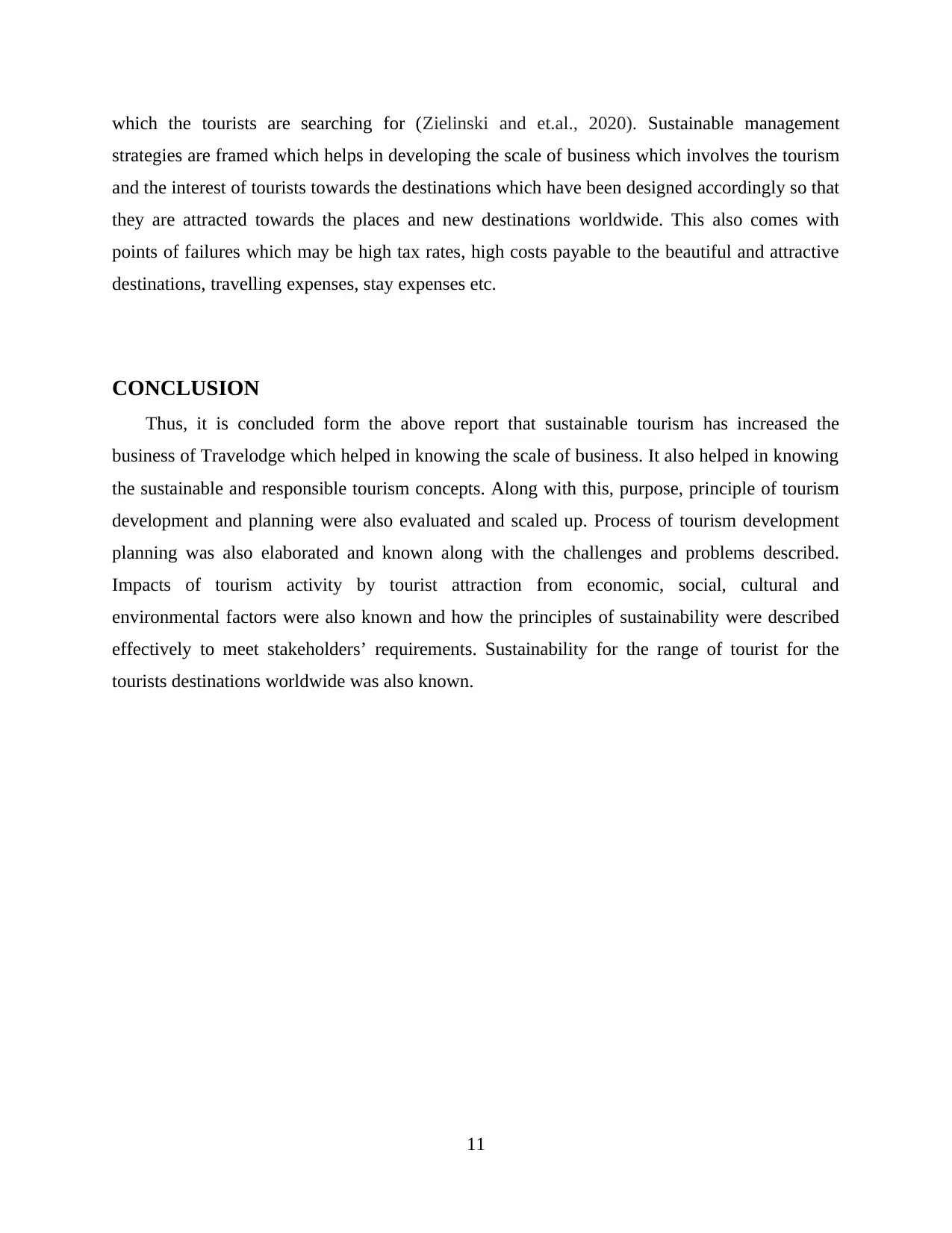
which the tourists are searching for (Zielinski and et.al., 2020). Sustainable management
strategies are framed which helps in developing the scale of business which involves the tourism
and the interest of tourists towards the destinations which have been designed accordingly so that
they are attracted towards the places and new destinations worldwide. This also comes with
points of failures which may be high tax rates, high costs payable to the beautiful and attractive
destinations, travelling expenses, stay expenses etc.
CONCLUSION
Thus, it is concluded form the above report that sustainable tourism has increased the
business of Travelodge which helped in knowing the scale of business. It also helped in knowing
the sustainable and responsible tourism concepts. Along with this, purpose, principle of tourism
development and planning were also evaluated and scaled up. Process of tourism development
planning was also elaborated and known along with the challenges and problems described.
Impacts of tourism activity by tourist attraction from economic, social, cultural and
environmental factors were also known and how the principles of sustainability were described
effectively to meet stakeholders’ requirements. Sustainability for the range of tourist for the
tourists destinations worldwide was also known.
11
strategies are framed which helps in developing the scale of business which involves the tourism
and the interest of tourists towards the destinations which have been designed accordingly so that
they are attracted towards the places and new destinations worldwide. This also comes with
points of failures which may be high tax rates, high costs payable to the beautiful and attractive
destinations, travelling expenses, stay expenses etc.
CONCLUSION
Thus, it is concluded form the above report that sustainable tourism has increased the
business of Travelodge which helped in knowing the scale of business. It also helped in knowing
the sustainable and responsible tourism concepts. Along with this, purpose, principle of tourism
development and planning were also evaluated and scaled up. Process of tourism development
planning was also elaborated and known along with the challenges and problems described.
Impacts of tourism activity by tourist attraction from economic, social, cultural and
environmental factors were also known and how the principles of sustainability were described
effectively to meet stakeholders’ requirements. Sustainability for the range of tourist for the
tourists destinations worldwide was also known.
11
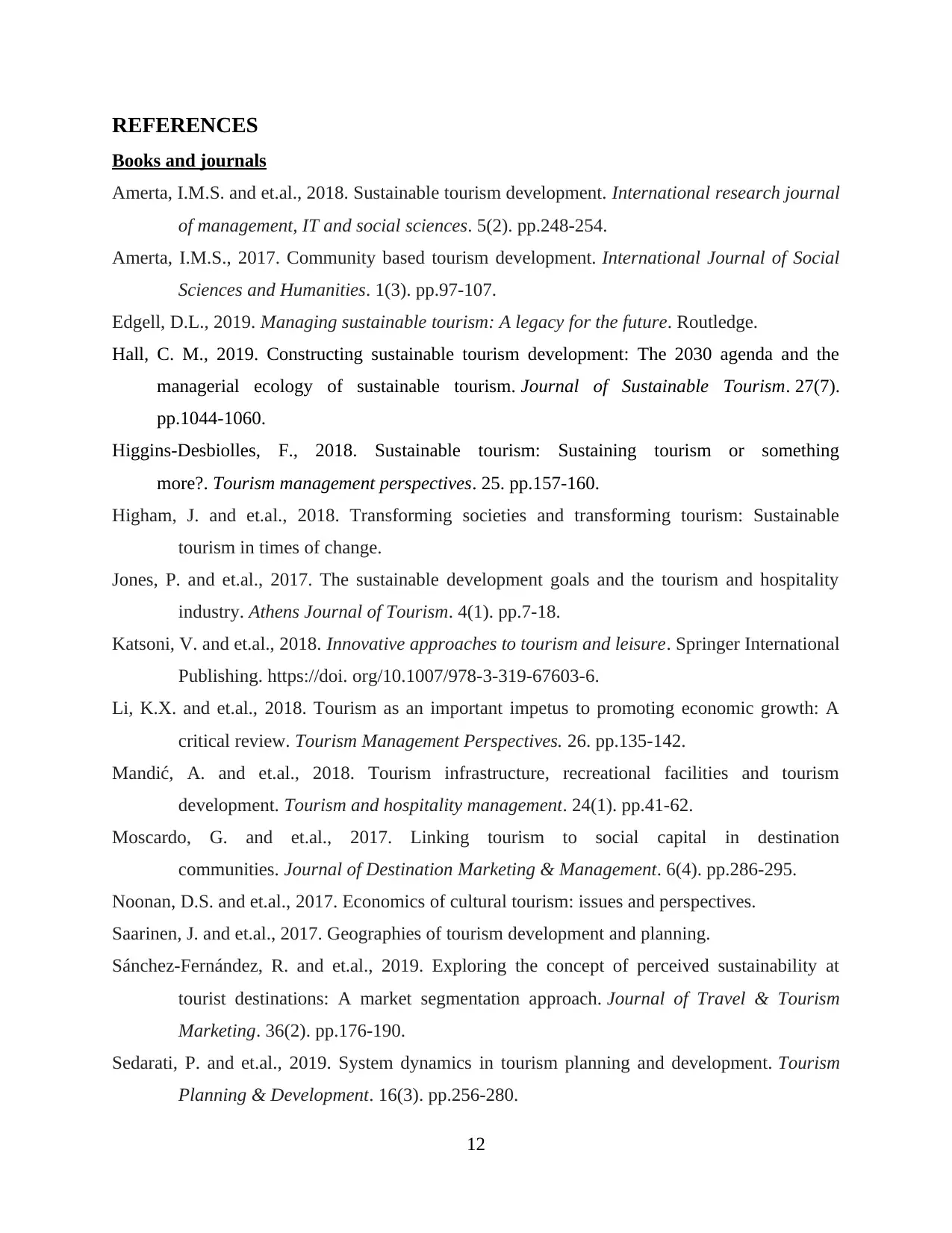
REFERENCES
Books and journals
Amerta, I.M.S. and et.al., 2018. Sustainable tourism development. International research journal
of management, IT and social sciences. 5(2). pp.248-254.
Amerta, I.M.S., 2017. Community based tourism development. International Journal of Social
Sciences and Humanities. 1(3). pp.97-107.
Edgell, D.L., 2019. Managing sustainable tourism: A legacy for the future. Routledge.
Hall, C. M., 2019. Constructing sustainable tourism development: The 2030 agenda and the
managerial ecology of sustainable tourism. Journal of Sustainable Tourism. 27(7).
pp.1044-1060.
Higgins-Desbiolles, F., 2018. Sustainable tourism: Sustaining tourism or something
more?. Tourism management perspectives. 25. pp.157-160.
Higham, J. and et.al., 2018. Transforming societies and transforming tourism: Sustainable
tourism in times of change.
Jones, P. and et.al., 2017. The sustainable development goals and the tourism and hospitality
industry. Athens Journal of Tourism. 4(1). pp.7-18.
Katsoni, V. and et.al., 2018. Innovative approaches to tourism and leisure. Springer International
Publishing. https://doi. org/10.1007/978-3-319-67603-6.
Li, K.X. and et.al., 2018. Tourism as an important impetus to promoting economic growth: A
critical review. Tourism Management Perspectives. 26. pp.135-142.
Mandić, A. and et.al., 2018. Tourism infrastructure, recreational facilities and tourism
development. Tourism and hospitality management. 24(1). pp.41-62.
Moscardo, G. and et.al., 2017. Linking tourism to social capital in destination
communities. Journal of Destination Marketing & Management. 6(4). pp.286-295.
Noonan, D.S. and et.al., 2017. Economics of cultural tourism: issues and perspectives.
Saarinen, J. and et.al., 2017. Geographies of tourism development and planning.
Sánchez-Fernández, R. and et.al., 2019. Exploring the concept of perceived sustainability at
tourist destinations: A market segmentation approach. Journal of Travel & Tourism
Marketing. 36(2). pp.176-190.
Sedarati, P. and et.al., 2019. System dynamics in tourism planning and development. Tourism
Planning & Development. 16(3). pp.256-280.
12
Books and journals
Amerta, I.M.S. and et.al., 2018. Sustainable tourism development. International research journal
of management, IT and social sciences. 5(2). pp.248-254.
Amerta, I.M.S., 2017. Community based tourism development. International Journal of Social
Sciences and Humanities. 1(3). pp.97-107.
Edgell, D.L., 2019. Managing sustainable tourism: A legacy for the future. Routledge.
Hall, C. M., 2019. Constructing sustainable tourism development: The 2030 agenda and the
managerial ecology of sustainable tourism. Journal of Sustainable Tourism. 27(7).
pp.1044-1060.
Higgins-Desbiolles, F., 2018. Sustainable tourism: Sustaining tourism or something
more?. Tourism management perspectives. 25. pp.157-160.
Higham, J. and et.al., 2018. Transforming societies and transforming tourism: Sustainable
tourism in times of change.
Jones, P. and et.al., 2017. The sustainable development goals and the tourism and hospitality
industry. Athens Journal of Tourism. 4(1). pp.7-18.
Katsoni, V. and et.al., 2018. Innovative approaches to tourism and leisure. Springer International
Publishing. https://doi. org/10.1007/978-3-319-67603-6.
Li, K.X. and et.al., 2018. Tourism as an important impetus to promoting economic growth: A
critical review. Tourism Management Perspectives. 26. pp.135-142.
Mandić, A. and et.al., 2018. Tourism infrastructure, recreational facilities and tourism
development. Tourism and hospitality management. 24(1). pp.41-62.
Moscardo, G. and et.al., 2017. Linking tourism to social capital in destination
communities. Journal of Destination Marketing & Management. 6(4). pp.286-295.
Noonan, D.S. and et.al., 2017. Economics of cultural tourism: issues and perspectives.
Saarinen, J. and et.al., 2017. Geographies of tourism development and planning.
Sánchez-Fernández, R. and et.al., 2019. Exploring the concept of perceived sustainability at
tourist destinations: A market segmentation approach. Journal of Travel & Tourism
Marketing. 36(2). pp.176-190.
Sedarati, P. and et.al., 2019. System dynamics in tourism planning and development. Tourism
Planning & Development. 16(3). pp.256-280.
12
⊘ This is a preview!⊘
Do you want full access?
Subscribe today to unlock all pages.

Trusted by 1+ million students worldwide
1 out of 13
Related Documents
Your All-in-One AI-Powered Toolkit for Academic Success.
+13062052269
info@desklib.com
Available 24*7 on WhatsApp / Email
![[object Object]](/_next/static/media/star-bottom.7253800d.svg)
Unlock your academic potential
Copyright © 2020–2026 A2Z Services. All Rights Reserved. Developed and managed by ZUCOL.




